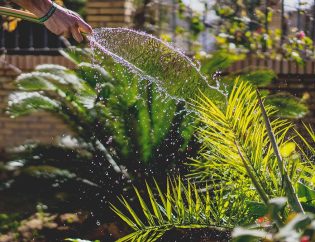
During the dog days of summer, there’s plenty to do in the garden. With a bit of planning, you can make the best use of your time by prioritizing what needs to be done. Schedule regular time to check off those chores on your to-do list so that you don’t get overwhelmed. And don’t forget to stop and smell the roses! Grill up some dinner, invite friends, relax and enjoy your outdoor oasis.
Be waterwise
Mulch beds with organic matter to suppress weeds and help retain moisture. Use drip irrigation when possible, and water early or late in the day—particularly when using sprinklers or watering wands—to minimize evaporation. For more ideas on how to make your garden more water efficient, check out these water wise articles.
Keep cool
Think of ways to cool off your yard. Plants are nature’s own air conditioner; areas under trees can be up to 20 degrees cooler than adjacent sunny spots. Plant a tree to shade the patio or deck, and locate benches and chairs underneath existing trees. Place a fountain, pool or small portable water feature near your patio for a cooling evaporation effect, and the soothing sound of moving water. Build an arbor and plant quick-growing vines at the base, or install a shade cloth. For more ideas, read: 5 Tips on Comfortable Outdoor Entertaining.
Add colorful containers
Keep annual containers looking their best with regular watering, fertilizing and deadheading. In mid-summer, cut back trailing annuals such as petunias and million bells by half and give regular feedings of water-soluble bloom booster fertilizer for a new flush of color. Replace tired-looking plants with new ones for an updated look. Move containers into mixed borders where there are holes or gaps for an element of surprise. Find out more on how to jazz up your garden with containers.
Mix it up
Don’t be afraid to combine edibles with ornamentals. Different colored lettuces make attractive edging along a pathway. Dinosaur (‘Lacinato’) kale, with its pale blue leaves, can be planted in containers and combined with annuals for a showy look. Nasturtiums, with edible flowers that liven up green salads, can be used as container accents, in raised beds, or climbing up a trellis. Get more inspiration on edible gardens that are both beautiful and functional.
Use edibles as ornamental accents
Many new varieties of fruits and vegetables have been bred to perform well in containers, making them a great choice for small decks or patios. BrazelBerries® raspberries or blueberries are attractive on their own, but can also be planted in colorful ceramic pots or combined with annuals such as trailing nasturtiums for an extra splash of color. For more on growing edibles in containers, read: Urban Edibles for Rooftop Gardens.
Freshen the deck
Hose down patio and deck areas occasionally, and wipe dust from patio furniture with a damp cloth. Switch out pillows or cushions, and move containers around for an updated look. Cut fresh flowers from the garden and arrange them in vases around your patio for an extra pop of color, and to enjoy your homegrown flowers up close. Get more outdoor living design ideas.
Keep pollinators happy
Insects and hummingbirds are crucial for pollination of edibles and other plants. Include a selection of native plants that will bloom over the growing season to attract a diversity of wildlife. Check with your local extension service or nursery to find out which varieties are most suitable to your area. Annual sunflowers and zinnias, or specialty wildflower mixes, are quick-growing options for new gardens or edible beds. Check out a garden that supports wildlife: A Naturalistic Garden Welcomes the Birds & the Bees.
Take note
Now’s the time to assess the garden. Make a list of what needs to be divided or replaced, and take a few snapshots on your phone as a visual reminder. Note if a plant is too big or small for a particular spot, and when you see varieties that might work better together. Fall and spring are the best times to move plants around, when the weather is cooler. Get more ideas on designing a border.
Think big
While the weather is good, tackle major projects, such as laying pavement for a new patio, building a pond or path, installing a new fence, or addressing drainage issues. Whether you plan to do it yourself, or hire a professional, do your research to make sure your project is compatible with your home and outdoor needs, meets any local building codes, and comes in on budget. Houzz and Pinterest are great sources for information, including materials, designers, and innovative ideas. Get additional landscape design inspiration.
Seek out inspiration
Visit botanical gardens and public parks, or participate in local garden tours for new design ideas and inspiration. Take photos—with permission—of particular areas that you like, or of plant combinations to try in your own yard. Document favorite hardscape materials such as pavers, gravel, trellises or furniture, and ask the homeowner if they know of a source. For ideas on public gardens to visit, check out these destinations.



